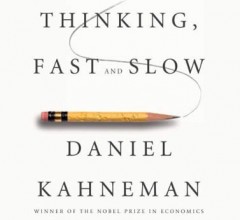

Their explanation is that, when participants could see both sets, they could see that Set A contains more good condition pieces than Set B.


Kahneman (and Christopher Hsee, who came up with this experiment) call this the less is more effect, and, to them, it shows how the brain fails to handle probability. When participants were only shown one set–either Set A or Set B–they priced Set A, on average at $33 and Set B at $23. When participants could see both sets, they valued, on average, Set A at $32 and Set B at $30. Set A has:Ĩ cups (6 in good condition and 2 broken)Ĩ saucers (1 in good condition and 7 broken) Take this example that asks volunteers to price out two dinnerware sets. But the way Kahneman demonstrates the fallibility of the brain I absolutely disagree with in the same way as I disagreed with math teachers who set snares for students with trick questions. Wilson makes that claim in On Human Nature, a most excellent book. That the brain is irrational is an argument I accept. When you get the answer wrong, then he tells you your brain is not reacting rationally. He presents leading questions that point you towards the incorrect answer. Well, Kahneman’s book is filled up with trick questions him and fellow accomplice Amos Tversky dreamt up over the years. But you were fooled by a diabolical question designed to trip up your brain in the heat of the moment. In many cases, you could have done the math. Then, looking closer, you would see that it was a trick question, designed to fool. Then, when reviewing the error, at first you would wonder whether the marker was incorrect. Invariably, you would get some of these wrong. Do you remember doing math quizzes in grade school? Sometimes you would have some diabolical teacher that would put trick questions on the exams. Not since reviewing Sam Harris’ The Moral Landscape: How Science Can Determine Human Valueshas a book frustrated me to this degree.

But it turns out I am quite allergic this book. Having heard so many positive reviews of Thinking, Fast and Slow, I had expected to enjoy reading it. I predict time will be unkind to psychologist Daniel Kahneman’s groundbreaking, important, and misguided book.


 0 kommentar(er)
0 kommentar(er)
